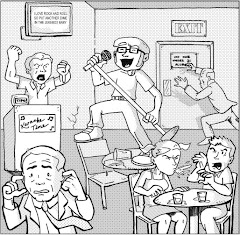Sparks: An Urban Fairytale #1, May 1999, Slave Labor Graphics Publishing
by Lawrence Marvit
letterer: Chris Williams
digital assistance: Parker Moore, Jess Nowell
story assistance: Julie Bowdle, Marcus Smith, Al Reinhardt
Blogger's note: As I feared, my recent move has severely limited my Internet access, so until I hook up a wireless connection at home, I'm afraid A Comic A Day will suffer a little infrequency. While I may not be able to post daily, I will still post a review for every day I missed, doubling or maybe even tripling your pleasure the next time you visit! Also, our new two bedroom has finally given my extensive action figure collection some room to breathe, so I'm willing to take this temporary technological hit. That's right, my Bucky O'Hare figures are back on display, people! So you can live a day or two without a review, alright?
A few days ago, I asked what makes for a good first issue in a comic book series, and I’ve dedicated the first month of A Comic A Day: Year Two to the analysis of the “number one issue” phenomenon. What I didn’t reveal was one of my personal preferences in such an inaugural issue, an element that, when presented competently, is sure to bring me back for issue two. So what is this mysterious, all powerful characteristic? Motivation.
If a comic book writer, coupled with an artist’s capability to convey his characters’ emotions, can establish his protagonist’s motivations to the level of eliciting empathy from the reader -- in this case, me -- I believe he’s instantly achieved the crowning objective of all art: creating a connection with one’s general audience. In Sparks: An Urban Fairytale, writer/artist Lawrence Marvit accomplishes this mission well within the opening act of this first issue, establishing his urban setting and likening it to a fairytale kingdom, complete with the princess in search for her prince charming. Alas, unlike the comely lasses found in Disney’s stable of fantasy royalty, Joe (short for Josephine) is a tomboyish mechanic, as socially awkward as she is capable under the hood of a car. Her loneliness is transparent, from the emotion abuse she suffers from her father to her inability to meet a man worthy of her expectations. With little power over the former, she decides to combat the latter by, well, building her ideal mate. He isn’t much to look at, made up of spare parts around her automotive junkyard, but he’s enough to fulfill Joe’s fleeting fancies . . . until, unbeknownst to her by the end of this issue, a lightning bolt brings the behemoth to life.
Lawrence Marvit’s writing style and high contrast line work is extremely minimalist, even cartoonish in its presentation of his urban kingdom, but his words and pictures blend into a compelling coming of age, not to mention coming to life, allegory. Some pages shine more than others, but I confess that I’ve read a later issue of Sparks (number 9, I think, scored from a Slave Labor Graphics grab bag at an Alternative Press Expo a few years ago), and I know style evolves with his story for the better. What I appreciate most from this issue is what’s lurking behind Marvit’s panels, and in the hearts of his protagonist Joe -- that smoldering loneliness. Marvit makes it clear; dwelling in a city of thousands and working a job that makes her an asset to society, Joe is still overwhelming lonely. And her plight is completely understandable.
What is about loneliness that compels general audiences so? Consider, I Am Legend has become one the blockbuster movie of the holiday season, despite the fact that it story focuses on the last man on Earth during a time of year generally reserved for spending time with friends and family. Such a film could have easily succeeded during the highly competitive summertime, but its studio opted for the holiday season, when the loneliness of its protagonist stands in stark contrast to the family-oriented celebrations of Thanksgiving and Christmas. Is loneliness, or the fear of being alone, that persuasive to the common man? Surely we’ve all felt like the last man on Earth, but to escape into such a story seems ironic during the holidays. Comic books are just as guilty of this universal phenomenon. Think about Superman, the character that kicked off the modern comic book medium as we know it; billed as the last son of a doomed world, Superman sought to overcome his loneliness by downplaying his powers and blending in with society. Batman’s crusade against crime is arguably an attempt to fill the lonely void left by his murdered parents, and the secret to Spider-man’s success was the awkward adolescence to which Stan Lee was sure his readers would relate. Even more contemporary, independent comics about fledgling romance hinge on its protagonists’ need for companionship.
The bottom line is, in a world that feels more interconnected than ever thanks to the wonders of communications technology and the Internet, loneliness is still as affecting a motivation in literature as ever -- maybe even more so because of its poignancy in contrast to our shrinking world. Sparks: An Urban Fairytale touches that nerve with a twist; Joe’s Prince Charming is a barreling bucket of bolts with just enough sentience to understand her. To see Marvit’s meek heroine achieve the benefits of this relationship is enough to bring anyone back for a second issue. After all, the real reward isn’t in establishing Joe’s motivation, but in seeing her desires achieved, which is a story that couldn’t be confined to any single issue. Indeed, man can’t live on one issue alone . . .!
Subscribe to:
Post Comments (Atom)



No comments:
Post a Comment